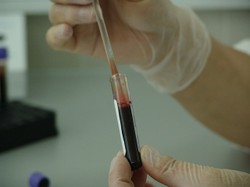The Burlington Northern and Santa Fe Railway Company (BNSF) agreed to pay $2.2 million and to change it's practices as part of a settlement with the U.S. Equal Employment Opportunity Commission (EEOC) on behalf of all it's employees, especially 36 workers that were sought out to be genetically tested without their agreement and awareness, during a physical examination as a result of their complaints of sustaining job related carpal tunnel syndrome injuries. These tests were considered a breach of the Americans with Disabilities Act of 1990. The settlement at BNR was fair to a large extent. BNSF needed to learn its lesson, and the public needed a scapegoat. However, the money would be better off going to a charity then to 36 employees. The fact that a settlement was reached and mediated outside of court is much better than having to go through a long and drawn out court case, that would result in a declared winner and loser.
The Railroad's actions were not fair, and they needed to be taught a lesson for the future. BNSF should not have sought to genetically screen their workers without their permission or awareness. If they thought that what they were doing was ok, then it would not have been a secret from their workers. These employees had experienced carpal tunnel syndrome injuries, which they claimed were linked to their labor. While they did not fire any employees as a result of this testing, they did threaten to fire those who did not take the test. They did not find the rare genetic marker that they tested for in any of the employees screened. Clearly, the Railroad was trying to gather proof or evidence in court that these injuries were not work related, by seeking to find a genetic tendency towards these injuries in these employees blood. However, one cannot do this without the person's consent, and the proper way for them to have done this would have been to explain the importance of blood testing to a legal judge and get a court order requiring these workers to get tested for the case. At least, they should ask the workers to sign a form showing their knowledge and consent to the genetic testing. They should not be allowed to discipline their workers for declining the medical evaluation. As a result of this court case, it has been established that in the future, BNSF will not genetically screen workers, will supply improved ADA education to its health workers, and its higher-ranking executives will appraise all major procedures. They also agreed not to strike back at any employee that did not consent to the blood tests, or that was involved in the lawsuit.








 eFaxon 05/11/2012
eFaxon 05/11/2012
 Delicious Cake Recipes From Scratchon 04/03/2012
Delicious Cake Recipes From Scratchon 04/03/2012
 Easy and Delicious Recipes for Newbieson 04/03/2012
Easy and Delicious Recipes for Newbieson 04/03/2012
 How to Choose a Preschool, Day Care or Playgroupon 04/02/2012
How to Choose a Preschool, Day Care or Playgroupon 04/02/2012



Comments
This should really infuriate people. It does me.